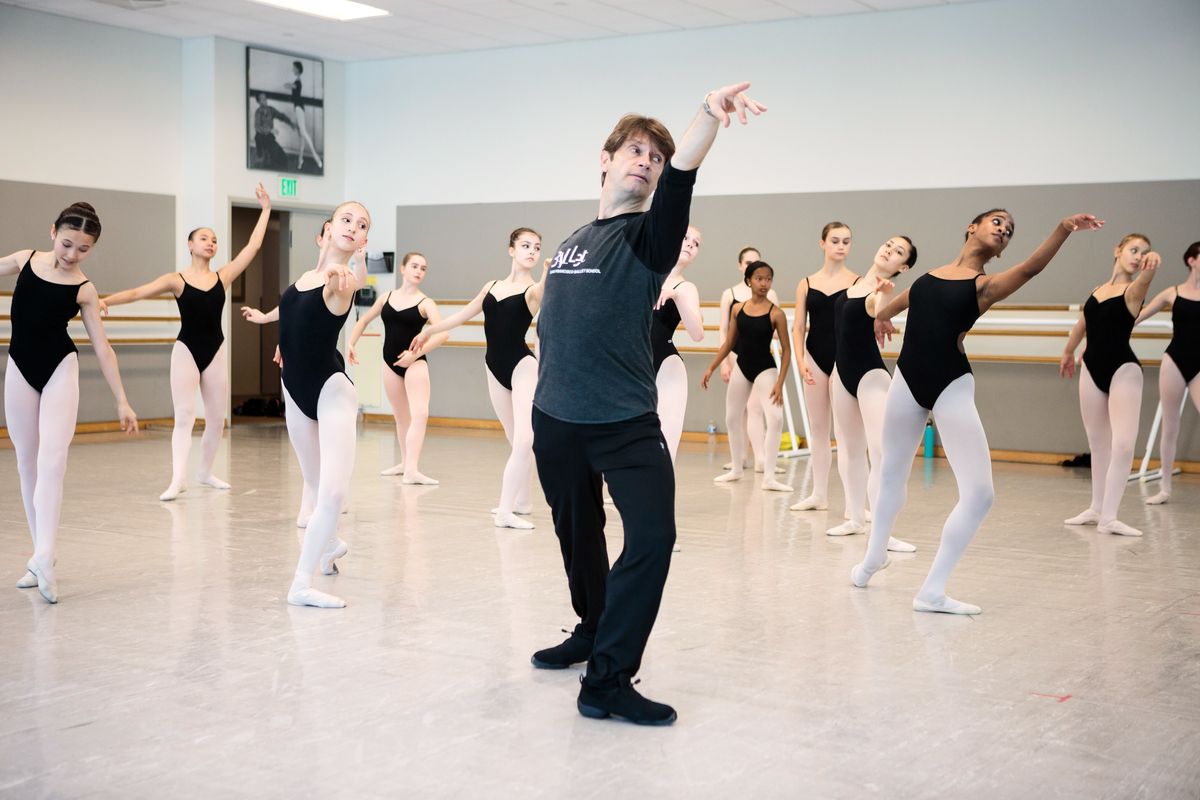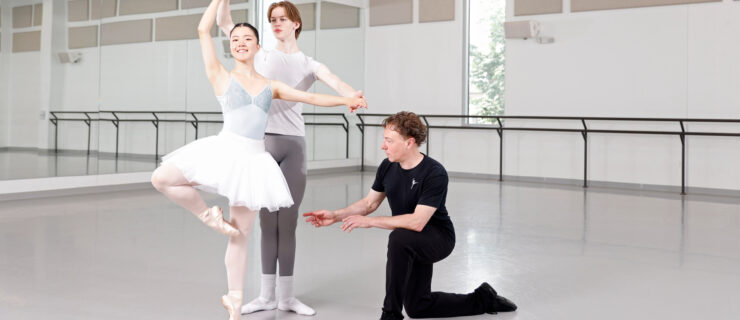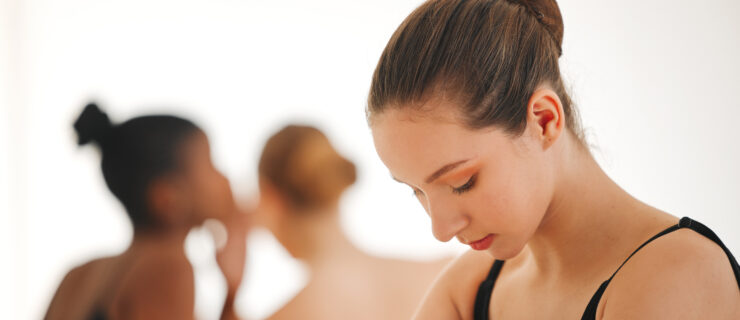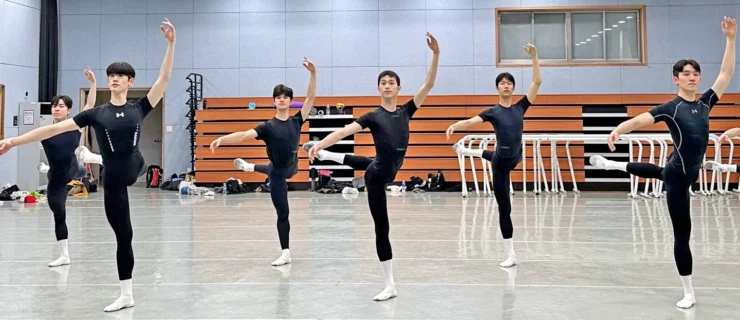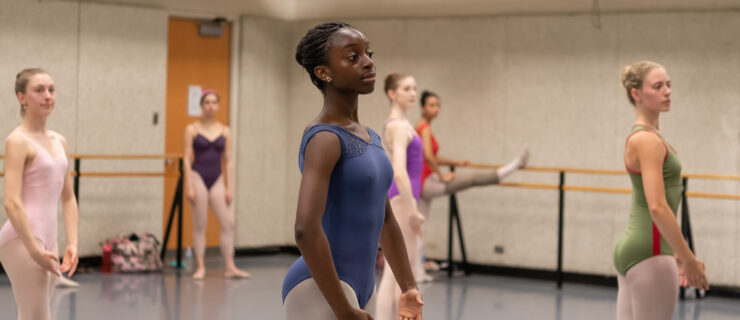How to Deal With Taking an Unfamiliar Class During Summer Intensive Audition Season
Updated on January 4, 2023.
Ariel McCarty’s training was predominantly classical until, at 15, she auditioned for Boston Ballet’s summer intensive. The audition class was in more of a Balanchine style, and the teacher corrected her right away. “She wanted me to accent the arm opening out quickly in my pliés, rather than through the whole phrase,” says McCarty, now a Colorado Ballet demi-soloist. She could have panicked, but, instead, she met the correction with a smile. “I tried it, and it felt not quite right. But the instructor said, ‘That’s the idea.’ ” After that, McCarty was able to let go of trying to be perfect in an unfamiliar style. “It opened me to a new idea of musicality. It’s exciting to try new things.”
The stress of summer intensive auditions is real: You’re in a strange place, taking a strange class, and pressure is high to show yourself at your best. But, as McCarty discovered, shaking off a bit of that pressure might be the best way to have a good audition. Two school directors agree, and explain why you should leave behind these common audition worries.
 Ariel McCarty (on her knee) in Serenade. Mike Watson, Courtesy Colorado Ballet
Ariel McCarty (on her knee) in Serenade. Mike Watson, Courtesy Colorado Ballet
The Style Issue
Picking up a new style can be especially nerve-racking in an audition class. But, says San Francisco Ballet School director Patrick Armand, “any technique comes from the same basic training; after that it’s a variation on a theme.” Of course, it may not feel like that when you’re auditioning—trying to figure out how to use your head at the barre, for instance, when you’re used to looking front, or attempting a pirouette en dehors from a straight back leg for the first time.
“We don’t expect kids to be already in the style of our school,” says Maria Torija, director of the BalletMet Academy. “You cannot learn that in one class.” The best tactic in auditions is to be yourself, rather than dancing in an uncomfortable imitation of a style. An exception is if the teacher makes a point of a particular stylistic detail, like musicality. In that case, pay close attention and give it your best effort. “Trust your ability to adapt,” Torija urges. “Be open to different ways, and show that you’re willing to try.”
A Scary New Step
Keep in mind that teachers may give certain steps in auditions to help the judges make level placements. Knowing a particular step, or not, is unlikely to affect your acceptance into the program. McCarty recalls a grand allégro that included a tour jeté fouetté, a step she had never seen before. “I remember thinking, That is so cool, but I have no idea how to do it!” By observing the teacher and fellow auditioners, and practicing in the back, McCarty was able to figure it out well enough to give it a try. In general, if you’re unsure about a step, you should ask a question. “It just shows that you care,” McCarty says.
Armand agrees, and will break down a step if he sees “questionable faces” while demonstrating. “You’re in a learning process,” he says. “The best thing about doing class with a different teacher is learning something new.” Presumably, the desire to learn is a major reason you want to attend a summer program. Viewing the audition as an educational experience is a great way to take some of the pressure off. Try asking yourself, “What did I learn?” instead of “How did I do?”
 Getty Images
Getty Images
A New Step On Pointe
Schools vary widely when introducing specific pointework elements, and the faculty running an audition knows that. Don’t throw yourself into something you haven’t learned how to do on pointe. “It’s not safe,” Torija explains, “and there’s nothing wrong with not knowing it yet.” Instead, say something. The teacher may adapt the step, replacing a pirouette with a passé relevé, for example. Or they may have you skip the combination, or try it on flat.
If you don’t feel comfortable speaking up in front of everyone, McCarty suggests approaching the teacher or the table to tell them more discreetly. Either way, chances are you won’t be speaking for yourself alone. “Someone else is probably wondering too; you’re never the only one.”
Pick It Up, Fast!
The ability to learn choreography quickly is a skill all dancers are supposed to possess and demonstrate in auditions. But what if your teacher at home gives short, simple combinations—or a set class—and the exercises in the audition are longer, or put together in a way that feels complicated and unnatural?
The key is to practice. Armand recommends his students go to as many auditions as they can, even for schools they aren’t interested in. “I want them to get used to being looked at, seen and judged. It’s important to know what’s going to happen, to be ready.”
If you cannot easily attend multiple practice auditions, Torija suggests doing some research online. “Watch classes from well-known schools, of kids more or less your level, to get an understanding of different ways of putting movements together. Try to learn the combinations, for your own brain.”
 Maria Torija coaches BalletMet Dance Academy summer intensive student Polina Myers. Jennifer Zmuda, Courtesy BalletMet
Maria Torija coaches BalletMet Dance Academy summer intensive student Polina Myers. Jennifer Zmuda, Courtesy BalletMet
Be Amazing Right Away
Compounding all the anxieties above is the pressure to dance every exercise impeccably on the first try. But, says Armand, “ballet is about repetition. You cannot expect to do something perfectly the first time.” Teachers and directors are likely to be especially forgiving in auditions, knowing that dancers may be nervous and unfamiliar with their teaching style. No one expects a student to know or be able to do everything—so don’t expect it of yourself. What Armand looks for is enthusiasm, not perfect facility or immediate attainment. “I want kids who are eager to learn and improve.”
Above all, maintain positivity. If you make a mistake or fall in an audition, don’t get discouraged or show frustration—continue. How you comport yourself in class can reveal as much as your dancing, so make sure your demeanor is sending the right message. “Show that you love to dance,” says Torija. “But that doesn’t mean being perfect.”
